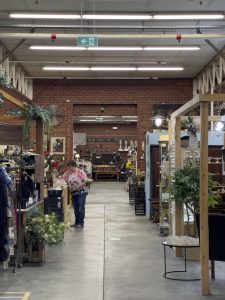Bag ban looming for the ACT
 AS D-Day approaches for the ban of plastic bags in the ACT, many consumers and businesses owners are still left confused about the ACT Government’s environmentally-friendly law, JELISA APPS reports.
AS D-Day approaches for the ban of plastic bags in the ACT, many consumers and businesses owners are still left confused about the ACT Government’s environmentally-friendly law, JELISA APPS reports.
What is the Bag Ban?
On 7 December 2010, Environment, Water and Climate Change Minister Simon Corbell announced that the ACT Legislative Assembly had passed legislation to ban the use of plastic shopping bags. The reasons behind the band were simple – to reduce environmental damage.
Corbell said in a press release at the time, “This is an important step forward in reducing the amount of plastic bags that are entering the waste stream, and waste that does not break down for many hundreds of years.”
For the past four months, the ACT has been going through the “transition” phase of the ban. During these months retailers have been allowed to supply plastic bags but have had to have an alternative bag that is permitted under the legislation to offer to customers. They have also been required to display a small sign alerting customers to the change (see picture).
However, from 1 November retailers will not be allowed to supply lightweight plastic bags and face a fine of up to $550 if they do. Bags that are not banned include paper bags, “green” reusable bags, heavy duty bags (such as those used in clothing stores) and barrier bags (those used for fruit and vegetables).
How will the ban effect businesses?
Geoff Whitfield, the owner of two Subway franchises in the ACT, says the ban on bags will effect him financially. He says the cost of supplying an alternative bag is a hit financially to small business owners like himself.
“Basically they’ve imposed an extra cost which is a substantial hit to my bottom line, which is not a very big bottom line and I’m not getting compensated,” he said.
Kate Carnell from the Australian Food and Grocery Council agrees that the new legislation will hurt small business owners the most.
“I think we often forget that the Subway franchisee, the IGA, even down to the Muffin Break, they are franchises but the people alone are just mum and dads. . . . It will be them who have to foot the bill,” she said.
Carnell says that not only will supplying an alternative plastic bag cost small business owners, but the changes in people’s shopping habits will also effect them financially.
“The dilemma here is that it effects the smaller guys probably significantly more than the bigger guys, the smaller corner stores where you pop in for your bread and your milk but then you buy a few other items while you are there and they rely on those few extra items… the great dilemma for them is if people don’t have a bag they won’t buy as much,” she said.
What help is available to small businesses?
Whitfield says he did raise the issue directly with Simon Corbell on the first Twitter Community Cabinet but he did not get back to him for two months. He said he eventually received a letter and a visit from a departmental.
“I did get someone from his department come around and talk to me so they were trying to help out, but there was not really anything they could do,” he said. “Basically this is the law, you’re stuck with it.”
He said that despite the cost to small business owners, there was no compensation available. Under the legislation he is allowed to charge for the supply of other bags but fears it may impact his business if he does.
“If other Subway owners don’t do it I’ll be judged as different from them,” he said.
How much will the ban help the environment?
Whilst the ban has been put in place for the benefit of the environment, Carnell says she questions how much the ban will really assist as the reusable “green” bags are not recyclable in Australia.
“The energy impact of recycling them, you know you have to ship them to China, is quite high so when you look at the overall carbon impact of the plastic bags we are used to getting in the supermarket versus the reusable green ones… the carbon footprint is not significantly better for the environment,” she said.
She acknowledges that plastic bags have left lasting damage on the environment, but says the government could have taken a better approach.
“Those plastic bags into the water ways are an issue so maybe what the government should have done is put more money into encouraging the technology around biodegradable plastic bags,” she said.
How will the ban affect manufactures?
Carnell says that a ban on lightweight plastic bags will actually be positive news for some of the members of the Australian Food and Grocery Council. She says that most people use the plastic shopping bags for bin liners or to wrap food scraps in and the ban on them will only drive up the sale of plastic bags such as bin liners.
“What seems to happen is that it causes an increase in the sales of the heavier duty plastic bags that you buy in the supermarket, which again has more of an impact on the environment… for some of our members who make the bin liners, their sales go up,” she said.
The future of the ban
Despite the criticism from people such as Carnell who in in the industry and small business owners such as Whitfield, the bag ban is going ahead.
Carnell says she would have liked more debate on the practical aspect of the ban
“it’s not a simple equation that banning plastic bags is just good for the environment… it’s not a well thought out policy,” she said.
As for Whitfield, he is now forced to either make the decision to charge customers for a bag or to foot the bill himself.
“In my mind it’s been put in without regard to the costs to the small business owner,” he said.





Be the first to comment!